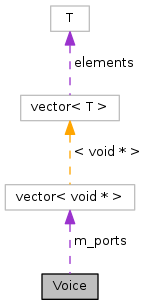#include <synth.hpp>
|
| void | on (unsigned char key, unsigned char velocity) |
| |
| void | off (unsigned char velocity) |
| |
| unsigned char | get_key () const |
| |
| void | render (uint32_t from, uint32_t to) |
| |
|
void | set_port_buffers (vector< void * > &ports) |
| |
|
| template<typename T > |
| T *& | p (uint32_t port) |
| |
| float *& | p (uint32_t port) |
| |
|
|
vector< void * > * | m_ports |
| |
A base class for synth voices, to be used with the Synth template class. You don't have to make your voice classes inherit this one, but it makes some things easier.
- Examples:
- beep.cpp.
| unsigned char get_key |
( |
| ) |
const |
|
inline |
Return the MIDI key that the voice is currently playing. lvtk::INVALID_KEY means that the voice is not active and could be used to play a new note.
- Examples:
- beep.cpp.
| void off |
( |
unsigned char |
velocity | ) |
|
|
inline |
Turn the voice off. This default implementation does nothing, you probably want to override it.
- Parameters
-
| velocity | The MIDI velocity for the Note Off event. |
- Examples:
- beep.cpp.
| void on |
( |
unsigned char |
key, |
|
|
unsigned char |
velocity |
|
) |
| |
|
inline |
Turn the voice on. This default implementation does nothing, you probably want to override it.
If key is lvtk::INVALID_KEY the voice should go silent as fast at possible (the synth may use this when it receives an All Sound Off event).
- Parameters
-
| key | The MIDI key for the note that the voice should play. |
| velocity | The MIDI velocity for the Note On event. |
- Examples:
- beep.cpp.
| float*& p |
( |
uint32_t |
port | ) |
|
|
inlineprotected |
Same as Plugin::p() - returns the buffer for the given port.
| void render |
( |
uint32_t |
from, |
|
|
uint32_t |
to |
|
) |
| |
|
inline |
Render audio for this voice to the output buffers, from sample from to sample to. The buffers may already contain audio from other voices, so use += instead of = when writing to it. This default implementation does nothing, you probably want to override it.
- Examples:
- beep.cpp.
The documentation for this class was generated from the following file:

 1.8.11
1.8.11